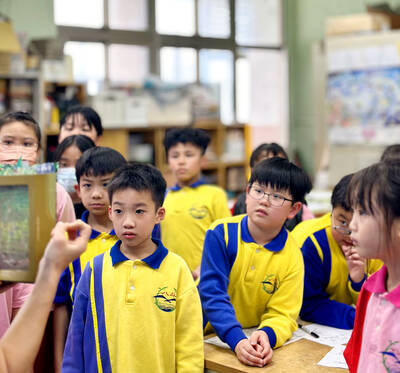To play a concert in the International Chopin Festival series that only contains six and a half minutes of music by Chopin takes some confidence. But if anyone can bring it off it’s the 23-year-old Beijing-born pianist Wang Yuja (王羽佳).
Wang is the latest classical piano-playing comet to roar out of China. She’s on a par with Lang Lang (郎朗) (with whom she shared a teacher at the elite Curtis Institute in Philadelphia), Yundi Li (李雲迪) and, going back further, Fou Tsong (傅聰). She may not have won the International Chopin Competition, but she’s been taking audiences by storm in the US and Europe. She’s already legendary for the force and brilliance of her playing, and for refusing to build up a charismatic stage persona — until, that is, the moment comes when she first hits the keys.
The program’s one Chopin item is the Waltz in C Sharp Minor, Op. 64 No. 2, a profound work that barely hides its inner melancholy under its surface brilliance. Wang’s preference, however, seems to be for sterner stuff.
Scarlatti’s one-movement sonatas, originally written for harpsichord, have attracted some modern pianists and Wang will play four of them. Much more substantial, however, is a selection of pieces by the late 19th-century mystic and experimentalist Alexander Scriabin that combine Romantic effusion with pre-modern difficulty and abstraction. These works have possibly always been more attractive to pianists than to listeners, but they will certainly be ideal material through which to perceive Wang’s intense and
fiery genius.
Also on the program are three Schubert lieder arranged as pieces for solo piano by Liszt, and the three movements from Stravinsky’s 1911 ballet Petroushka that the composer arranged for solo piano in 1921 for use by Artur Rubinstein.
The program will be played twice, first in Hsinchu on Monday, then in Taipei on Wednesday. These concerts have all the hallmarks of being special occasions. Wang, though already eminent, is still a rising star, and the program she’s chosen is clearly one that both decisively exhibits her talents and suits her highly individualistic nature.
Wang Yuja plays at the Hsinchu Municipal Auditorium (新竹市文化局演藝廳), 17, Dongda Rd Sec 2, Hsinchu City (新竹市東大路二段17號), on Monday at 7:30pm, and at the National Concert Hall, Taipei, at 7:30pm on Wednesday.
Tickets are NT$400 to NT$1,800 (Hsinchu) and NT$800 to NT$2,800 (Taipei), available
from ERA ticket outlets, online at www.ticket.com.tw, or
7-Eleven ibon and FamilyMart
(全家) FamiPort kiosks.

May 26 to June 1 When the Qing Dynasty first took control over many parts of Taiwan in 1684, it roughly continued the Kingdom of Tungning’s administrative borders (see below), setting up one prefecture and three counties. The actual area of control covered today’s Chiayi, Tainan and Kaohsiung. The administrative center was in Taiwan Prefecture, in today’s Tainan. But as Han settlement expanded and due to rebellions and other international incidents, the administrative units became more complex. By the time Taiwan became a province of the Qing in 1887, there were three prefectures, eleven counties, three subprefectures and one directly-administered prefecture, with

It’s an enormous dome of colorful glass, something between the Sistine Chapel and a Marc Chagall fresco. And yet, it’s just a subway station. Formosa Boulevard is the heart of Kaohsiung’s mass transit system. In metro terms, it’s modest: the only transfer station in a network with just two lines. But it’s a landmark nonetheless: a civic space that serves as much more than a point of transit. On a hot Sunday, the corridors and vast halls are filled with a market selling everything from second-hand clothes to toys and house decorations. It’s just one of the many events the station hosts,

Through art and storytelling, La Benida Hui empowers children to become environmental heroes, using everything from SpongeBob to microorganisms to reimagine their relationship with nature. “I tell the students that they have superpowers. It needs to be emphasized that their choices can make a difference,” says Hui, an environmental artist and education specialist. For her second year as Badou Elementary’s artist in residence, Hui leads creative lessons on environmental protection, where students reflect on their relationship with nature and transform beach waste into artworks. Standing in lush green hills overlooking the ocean with land extending into the intertidal zone, the school in Keelung

Taiwan Power Co (Taipower, 台電) and the New Taipei City Government in May last year agreed to allow the activation of a spent fuel storage facility for the Jinshan Nuclear Power Plant in Shihmen District (石門). The deal ended eleven years of legal wrangling. According to the Taipower announcement, the city government engaged in repeated delays, failing to approve water and soil conservation plans. Taipower said at the time that plans for another dry storage facility for the Guosheng Nuclear Power Plant in New Taipei City’s Wanli District (萬里) remained stuck in legal limbo. Later that year an agreement was reached